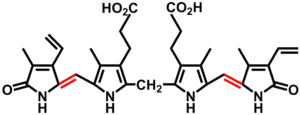Hereditary hyperbilirubinemia
Hereditary hyperbilirubinemia refers to the condition where levels of bilirubin are elevated, for reasons that can be attributed to a metabolic disorder.
| Hereditary hyperbilirubinemia | |
|---|---|
 | |
| Bilirubin levels are increased by this condition | |
| Specialty | Endocrinology |
An example is Crigler–Najjar syndrome.
Symptoms and signs
UGT1A1 gene mutations causes the condition. As a result, there can be reduced functionality of the bilirubin-UGT enzyme. Eventually it causes unconjugated hyperbilirubinemia and jaundice as substance accumulates in the body due to the reduced ability of the enzyme.[1]
Diagnosis
References
- Reference, Genetics Home. "Crigler-Najjar syndrome". Genetics Home Reference.
Further reading
- Elferink RP, Ottenhoff R, Liefting W, de Haan J, Jansen PL (August 1989). "Hepatobiliary transport of glutathione and glutathione conjugate in rats with hereditary hyperbilirubinemia". J. Clin. Invest. 84 (2): 476–83. doi:10.1172/JCI114189. PMC 548906. PMID 2760197.
External links
This article is issued from Wikipedia. The text is licensed under Creative Commons - Attribution - Sharealike. Additional terms may apply for the media files.